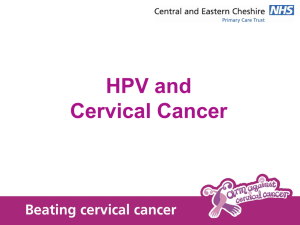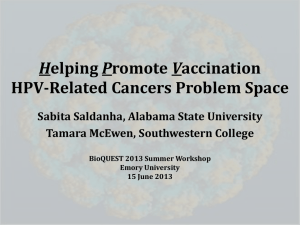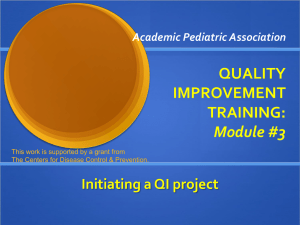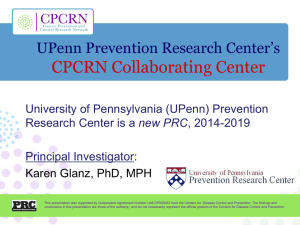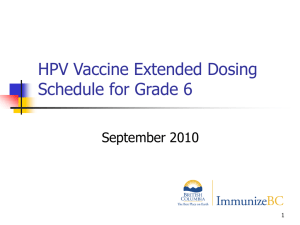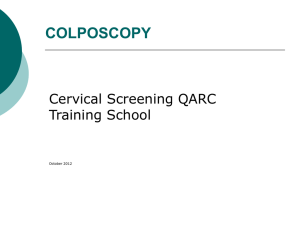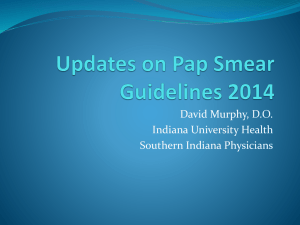University of Texas
advertisement
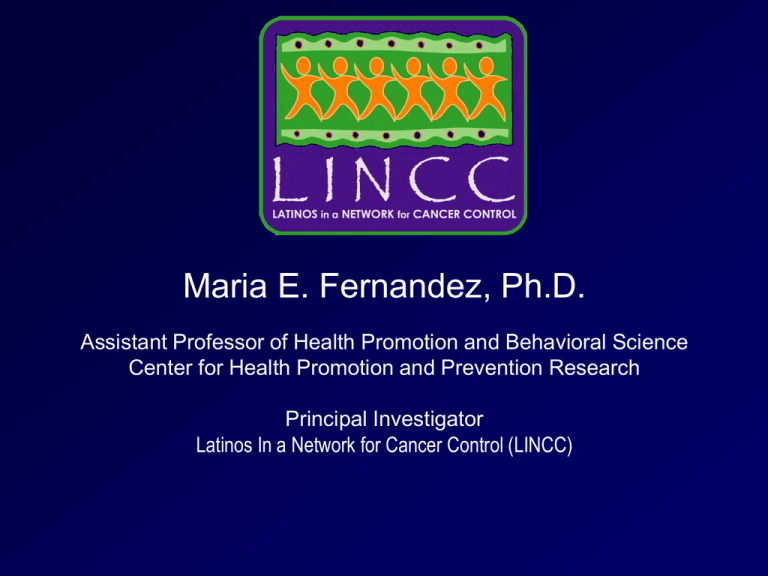
Maria E. Fernandez, Ph.D. Assistant Professor of Health Promotion and Behavioral Science Center for Health Promotion and Prevention Research Principal Investigator Latinos In a Network for Cancer Control (LINCC) LINCC Investigators and Staff Principal Investigator: Maria Fernandez Co-Investigators: Pat Mullen, Kay Bartholomew, Sally Vernon, Theresa Byrd, Belinda Reininger, LINCC Staff Co-Project Directors: Larissa Estes & Lonique Pritchett Adm. Asst.: Tamula Pouncey Postdoctoral Fellows Sarah Arvey, Lara Staub Presentation Overview • LINCC – Mission and network structure • LINCC activities according to the CPCRN logic model • Examples of ongoing LINCC research LINCC Mission To reduce cancer-related health disparities among Hispanics/Latinos through a network of academic, public health, provider, and community partnerships engaged in communitybased intervention, implementation and dissemination research and practice. CPCRN Logic Model Inputs Organizing Activities Network Activities Network Outcomes Proximal Outcomes Distal Outcomes (Coordinating Center & A B CPCRN Organizational Structure Infrastructure Support Member-Center Capacity Coordinating Center Capacity Steering Committee) A. Develop and Facilitate Network Infrastructure (Workgroups, Steering Committee, and Network B Meetings; 1 B. Policies and Procedures) Engage Outside Experts as Necessary CDC/NCI A 1 The Guide to Community Preventive Services RTIPs Cancer Control PLANET National and Regional Health Priorities National and Regional Health Disparities A. Develop Network Vision and Priorities for Research D Educate Partners About EvidenceC Based 1 Approaches to Cancer Prevention and Control Increase the Identification, D Delivery, 1 Maintenance, and Evaluation of EBIs by Partners Use Promising Dissemination C Strategies to 2 Address Research Priority Areas and Specific Audiences B. Create a Plan for Disseminating EBIs into Practice B C. Create a Process to Promote the 2 Visibility of CPCRN, its Members, and Produtcs D. Create Strong Processes for Collaboration E Presentations, and Publications. Research Findings Related to D Evidence-Based 3 Recommendations Conduct Program Evaluation, and Intervention, C Replication, and 3 Dissemination Research; Seek Funding; Submit Grant Applications and Manuscripts F Increased D Funding, 2 Reports, Plans, Policies Generated D with State and 4 National Level Cancer Programs CONTRIBUTES TO Affiliate Members C National, State, Community, and Local Organizations E Adopt EBIs and 1 Implement Intervention Strategies for Cancer Prevention and Control Improved Cancer Related Health Behaviors: Reduced Consumption of Tobacco F Products 1 Increased Sun Safety Improved Dietary Behavior Increased Physical Activity F Reduced Cancer 3 Morbidity and Mortality Increased Informed Decision F Making for Cancer 2 Screening and Increased Use of Effective Cancer Screening Tests * EBIs = Evidence Based Interventions Network Affiliates Investigators and Staff Maria Fernandez – PI Pat Mullen, Kay Bartholomew, Sally Vernon, Theresa Byrd, Belinda Reininger, - Co-Is Larissa Estes– GRA Lonique Pritchett– GRA Tamula Pouncey– Adm. Asst. Core Network Executive Committee PI: Maria. E. Fernandez PI Subcontractors: Lovell Jones (CMHR), Amelie Ramirez (Redes), Sylvia Partida (NCFH) Community Representative: Desiree Gonzales Consultants Armando Valdez Gil Ramirez Community Organizations Migrant Health Promotion The Hispanic Health Coalition Network Partners Cancer Control / Health Service Organizations Texas Comprehensive Cancer Coalition National Center for Farmworker Health Frontera de Salud American Cancer Society Mano a Mano Center for Border Health Research Texas Cancer Council Proyecto Juan Diego Gateway Community Ctr Center for Sustainable Health Outreach Kelsey Research Foundation Su Clínica Familiar Sanchez Cancer Center Texas Dept of State Health Services BCCCP Cancer Information Service El Milagro Clinic Cancer Stop Prgm •Nuestra Clinica del Valle •The Rose •A&M Colonias Program •U.S. Border Health Commission •Nat’l Assoc. of Community Health Centers •Collegiate Cancer Council •Valley Colorectal Screening Info. & Svcs-UTMB McAllen •UTHSC-San Antonio •South Texas Cancer Center •Brownsville Community Health Ctr •Community Action Council of South Texas •Planned Parenthood (Hidalgo Cty) •Leukemia & Lymphoma Society •ICCC Chronic Disease Research Ctr-Baylor •Center to Eliminate Health Disparities-UTMB Galveston •Cancer & Chronic Disease Consortium Academic Institutions UTMB Education Cancer Center University of of New Jersey Medical School UT-MD Anderson Health Disparities University of Puerto Rico Comp. Cancer Center UTHSC San Antonio Redes En Acción Community Network Prog. UTHSC-Houston, SPH Center for Health Promotion & Prevention Research Brownsville Regional Campus Hispanic Health Research Center El Paso Regional Campus Reaching Beyond Texas: New Collaborations • University of Puerto Rico Comprehensive Cancer Center • University of San Salvador, El Salvador • National Institute of Public Health, Cuernavaca, Mexico LINCC Activities Educate Partners About Evidence-Based Approaches to Cancer Prevention and Control • Texas Comprehensive Cancer Control Coalition (TCCCC) • UT-MDA-UPRCCC Outreach program (U54) • NBCCEDP Training (CPCRN Collaboration) • EBA Workgroup (CPCRN Collaboration) Texas Comprehensive Cancer Control Coalition • Texas Cancer Plan – Revision & Implementation • TCCCC Goal II (Screening) Subcommittee – LINCC led logic model development – Provided recommended approaches – Three communities in Texas implementing CRCS community programs • Colorectal Cancer Screening Workshop for Community Partners Puerto Rico Community Cancer Control Outreach Program (U54) • Maintain, strengthen and further develop a cancer control outreach network and develop new collaborations (BCCEDP, Comp. cancer) • Conduct a community assessment • Develop capacity for health care providers and community organizations to use EBAs • Develop and implement sustainability strategies El Salvador Training Program on Health Promotion Planning • Taught health promotion planning to academic and public health professionals • Training on finding and using EBAs • Health Education academic program curriculum revision LINCC Activities Use Promising Dissemination Strategies to Address Research Priority Areas and Specific Audiences Lay Health Worker and Train the Trainer Models – Cultivando la Salud, Amigas, SIP 21 Capacity building and systems change – Reminder systems, Use of quitlines (PRQ) Technology and Tailoring – Breast Cancer Education Kiosks – CLS –Dissemination and Implementation Assistance LINCC Activities Conduct Program Evaluation; Intervention, Replication, and Dissemination Research; Seek Funding; Submit Grant Applications and Manuscripts Research Topic Areas: Breast Cancer Screening Cervical Cancer Screening Prostate Cancer Screening IDM Hematologic Cancers – Diagnosis and Referral Tobacco Obesity Prevention HPV LINCC Activities Program Evaluation and Intervention Research • • • • • • Program Evaluations for Texas Cancer Council Increasing referrals for hematologic malignancies Prostate cancer screening IDM (SIPs 21 and 23) Increasing colorectal cancer screening (SIP 18, R01) AMIGAS-cervical cancer screening HPV studies (vaccine acceptability, psychosocial impact) LINCC Activities Dissemination and Implementation Research • NCFH –CLS Dissemination and implementation pilot • R01 – Cultivando la Salud Dissemination & Implementation • U54 MD Anderson & University of Puerto Rico - Community Outreach Network • Dissemination of Breast Cancer Kiosks • R25E –TACTIC Trial of Interventions to Increase Utilization of CRCS and Promote Informed Decision Making about CRCS among Hispanic Men and Women SIP 18-04 Vale la Pena…. PREVENIR Small Media Intervention Flipchart Vale la Pena Prevenir: Un Programa Educativo sobre el Cáncer Colorectal Prevention – It’s Worth It: A Colorectal Cancer Education Program Tailored Interactive Multimedia Intervention Targeted for: • Hispanics • Low literacy level • Low education Tailored to: • Gender • Language preference •Awareness of CRCS • Individual Stage of Change • Attitudes about screening •Knowledge • Specific barriers Cognitive testing of Spanish language items to measure colorectal cancer screening among Hispanics • Used CRCS core questions • Results of cognitive interviews in LRGV indicate the need for changes and alternative approaches to describing the tests • Exploring the possibility of making this a cross-network collaboration (University of Washington) 19 Interpersonal communication processes of Lay Health Workers. • Observations of promotora delivery of interventions • Interviews with promotoras and participants • LRGV site • Small media • TIMI • Control The AMIGAS study 2008 Study sites Houston, TX • Urban Community • 200 women Yakima, WA El Paso TX • Rural Community • 200 women • Border Community • 200 women The AMIGAS study 2008 Intervention Groups Full AMIGAS Movie + Flipchart + Other components 50 women AMIGAS Movie Movie + Other components 50 women AMIGAS Flipchart Flipchart + Other components 50 women Control No intervention 50 women Community Interventions in Non-Medical Settings to Increase Informed Decision Making for Prostate Cancer Screening (SIP 21) • Formative research: 24 key informant interviews; 20 focus groups in El Paso, TX; Columbia, SC. • Systematic literature review on processes men need to engage in to perform IDM • Intervention mapping used to develop two community interventions (lay health worker and church-based) Community Interventions in Non-Medical Settings to Increase Informed Decision Making for Prostate Cancer Screening (SIP 21) Preliminary Findings • Intervention group more likely to move in direction of autonomy (or more likely to move away from direction of passivity) • For both prostate testing role and health care role Promoting IDM for Prostate Cancer Screening (SIP 23) CME for Primary Care Providers Currently a slide presentation with notes Algorithm for providers Undergoing testing in a cluster randomized trial Patient Decision Aid Audio booklet in English and Spanish Men’s Health Booklet and CD HPV-related Projects Topics • Psychosocial impact of HPV diagnosis • Factors influencing HPV immunization • Understanding the need for HPV education and health promotion efforts, • Development and testing of materials to increase -HPV information seeking (CIS) -HPV immunization HPV Knowledge and Attitudes on the TX-Mexico Border 5 focus groups in the LRGV • Low knowledge and awareness of HPV and relation to cervical cancer • Emergent themes of fear of disease and infidelity • Consideration of cultural norms and values concerning disease, sexuality, and gender is important for future intervention development HPV in the LRGV A qualitative study with HPV positive women Results of in-depth Interviews with 44 Latina women • Only 18 understood they were HPV+ and that HPV was an STI • All women expressed surprise and fear • Generational differences found – Single, unattached women were more concerned about money, day to day problems, the possibility of cancer, and their fertility – Women with children and in long-term relationships feared disclosure to their partners would lead to accusations of infidelity and/or abandonment HPV in the LRGV Predictors of vaccine acceptability by HPV status • Interviews with 234 HPV+ women and 183 HPV- women • HPV+ Latinas more likely than HPV negative Latinas to: • have heard about the HPV vaccine (74% v 60%) • be in favor of a law requiring HPV vaccine before entry into sixth grade (86% v 58%) • be in favor of girls receiving the vaccine at age 12 or younger (62% v 50%) Other HPV studies • Qualitative study with parents and adolescents in Houston • Factors associated with breast and cervical cancer screening (PR BRFSS) • Knowledge and attitudes of HPV and HPV vaccine acceptability in Puerto Rico (N=3000) • AMIGAS trial- HPV knowledge and acceptability items added Gracias
